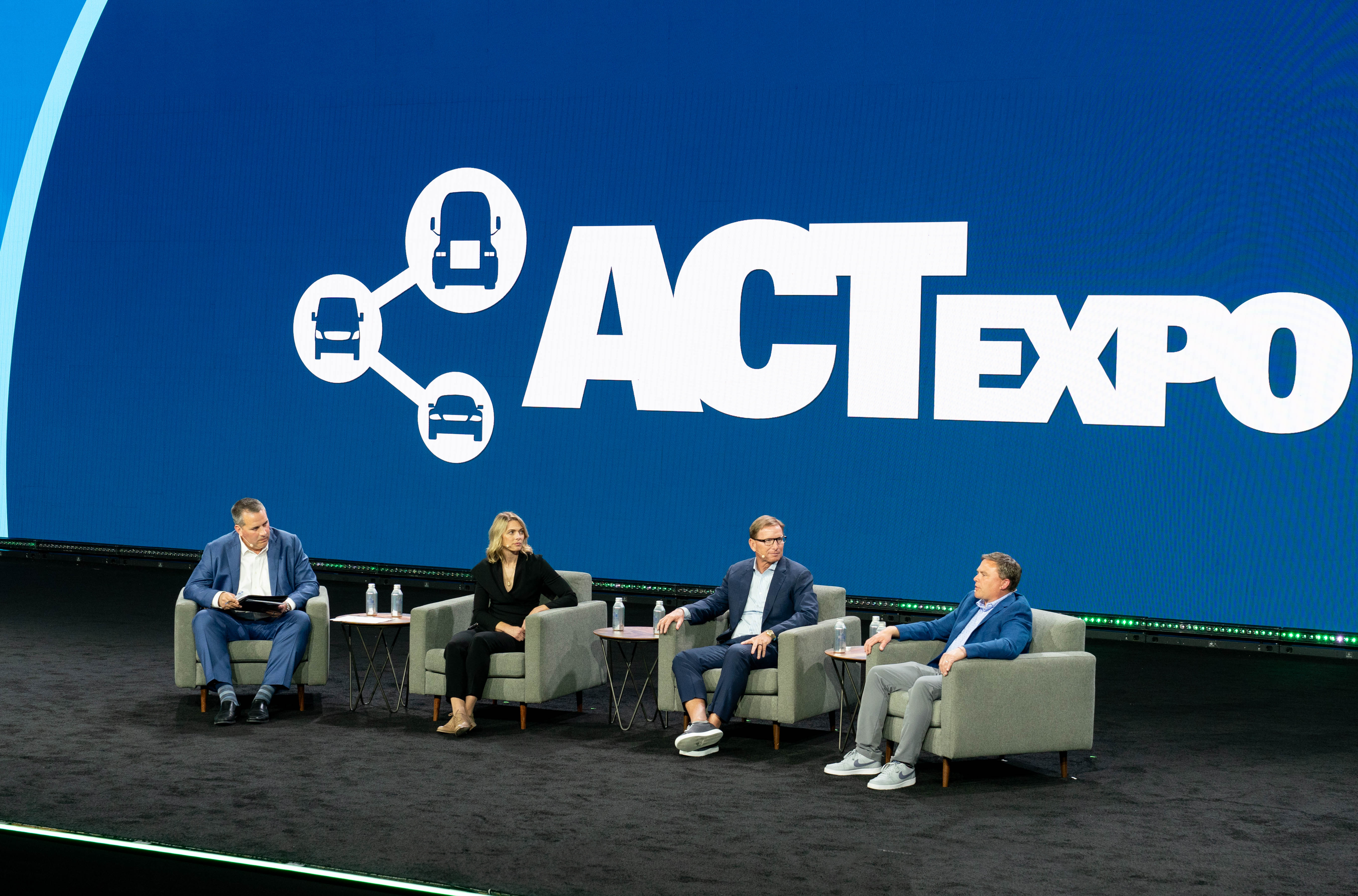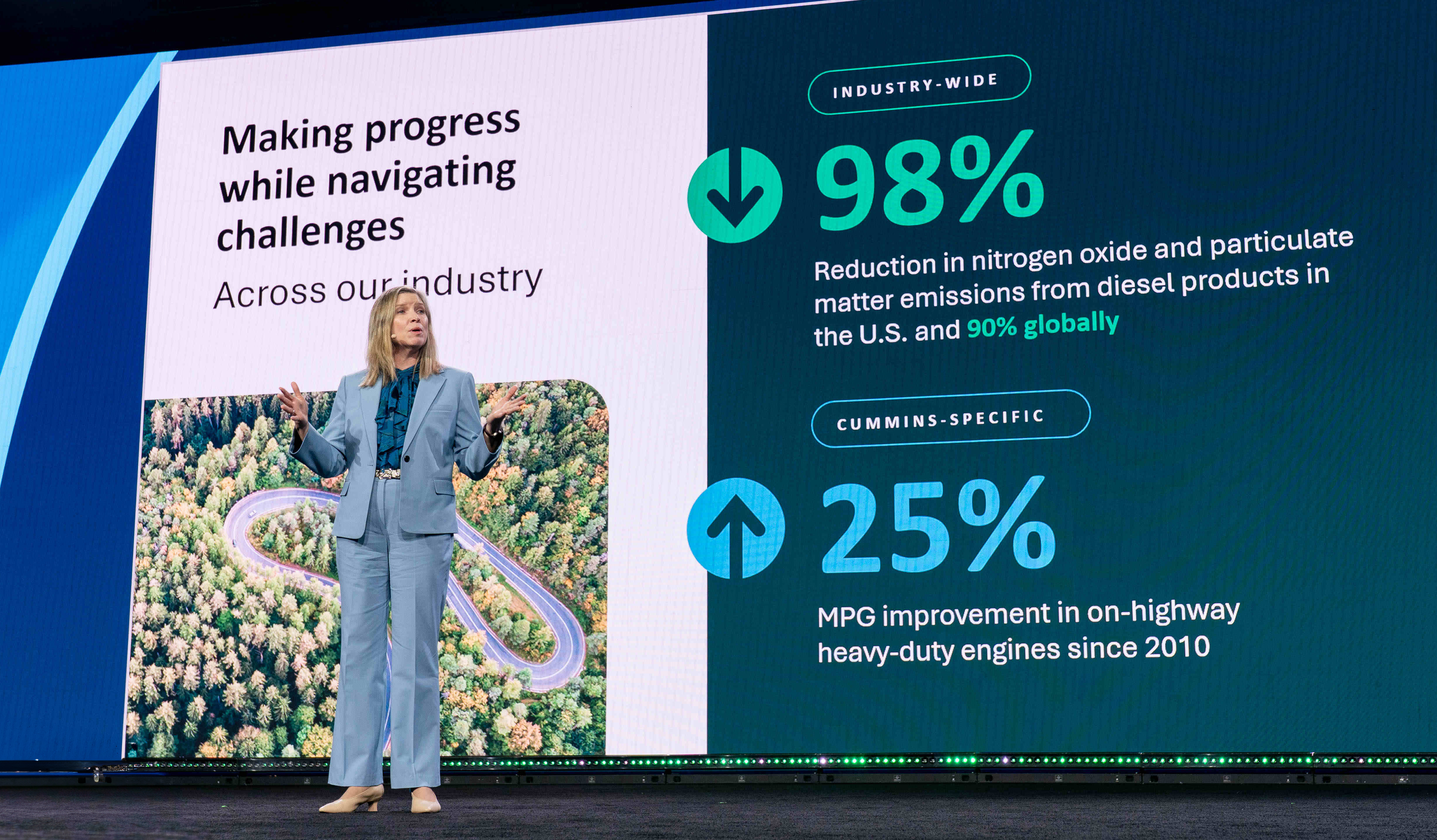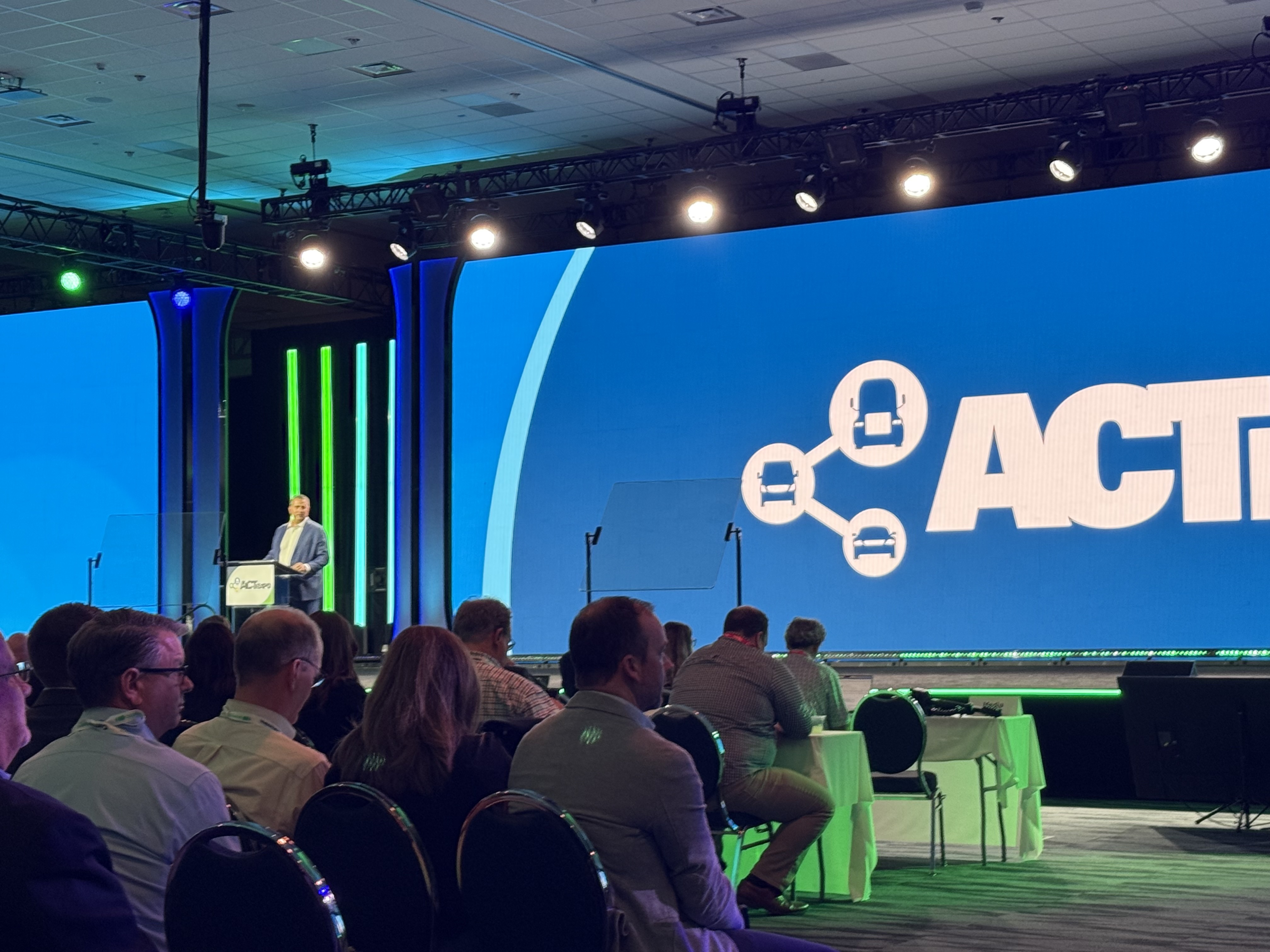Cummins CEO, Jennifer Rumsey, Charts a Pragmatic Course for Fleet Sustainability
"We must consider a fuel or power source's life cycle emissions when making decisions about emissions reduction and nationwide standards," -...
Keep an eye on the road
Simplify your driver's routine
For efficient decision making
Ensure the compliance of your fleet
Simplify the daily life of your drivers
Maximize the value of your data
Unparalleled monitoring of your assets
The friendly competition that pays off
Planning powered by data
Exceed your customers' expectations
Provide better service to your users
Maximize the satisfaction of your citizens
Simplify your daily life on the construction site
Facilitate the electrification of your fleet
Our experts meet your needs
Easily meet the standards
Improve the safety of your drivers
Protect your data and your fleet
6 min read
![]() Anthony Mainville
Apr 29, 2025 9:57:13 PM
Anthony Mainville
Apr 29, 2025 9:57:13 PM

"We're past the point of no return, advanced technology and cleaner fuels are our future." Erik Neandross
The energy was electric in the packed North 200 Level auditorium of the Anaheim Convention Center. Fleet executives leaned forward in their seats as industry titans from Martin Brower, First Student, and Paper Transport took their places on stage. This wasn't just another industry panel—this was "A View from the C-Suite," where the architects of transportation's future would share their vision for what comes next in the decarbonization journey.
ACT Expo 2025's schedule described this session as a chance to hear directly from "the most progressive companies in the world about their clean fleet projects" and understand "what technology and fuel options are delivering a positive Total Cost of Ownership." What unfolded over the next hour wasn't just another industry discussion—it was a practical roadmap for fleets navigating the complex landscape of decarbonization technologies, showing how real companies were finding success through multi-energy approaches and data-powered decision making.
The record-breaking crowd of 12,000+ attendees at ACT Expo 2025 reflected an industry moving forward with determination, even amid regulatory shifts. These C-suite leaders weren't discussing theoretical futures—they were sharing proven strategies their companies were implementing today across various fuel types, technologies, and applications.
Sarah Burke, representing Martin Brower with its 10,000-vehicle global fleet, illustrated this point perfectly. "Absolutely, for us, we base our approach on science-based targets," she explained, detailing their commitment to reduce absolute emissions by more than 50%. "It's no less important for our customers, it's no less important to us... we fully expect to hit that target."
What was most striking about the panel wasn't just the scale of commitments—like First Student's bold plan to deploy 30,000 electric school buses by 2035—but the pragmatic optimism that pervaded every conversation. These weren't idealistic promises; they were business strategies built on solid return-on-investment calculations and customer demands.
The audience fell silent as John Kenning, CEO of First Student, shared details of their ambitious electric school bus deployment in Quebec—a flagship project that showcased what's possible when vision meets execution.
"We have more than 250 of those vehicles in Canada running today," Kenning explained with evident pride. "We've partnered very heavily with the Government of Canada with a number of grants that have provided us and really kick-started this off."
What made this story particularly meaningful for us at AttriX was our behind-the-scenes role in this success. Our telematics platform has been collecting and analyzing data from these electric buses since the program's inception, creating anonymized performance dashboards that overcome range anxiety and validate operational feasibility, even through Quebec's notorious winters.
The partnership between First Student and AttriX has become a model for data-driven fleet electrification. Our systems silently capture millions of data points—from battery performance to energy consumption patterns—transforming them into actionable intelligence that's helping First Student strategically expand their electric fleet.
"We've gone over six million miles today," Kenning announced to spontaneous applause. This achievement represents the perfect alignment of vision (First Student's commitment), policy (Canadian government support), and technology (AttriX's data solutions)—proving that large-scale fleet electrification isn't just possible; it's happening now in Quebec.

While electrification dominated headlines, the panel made it clear that the industry is pursuing multiple paths toward decarbonization simultaneously. Ben Schill of Paper Transport shared their success with renewable natural gas (RNG), which has powered their fleet for more than eight million miles.
"You know, there was a point that we thought we'd go all in on natural gas," Schill reflected. "But probably one of the most important things was for us to say we don't want to go all in because all these other technologies are coming about."
This pragmatic approach—embracing a diversity of solutions rather than betting everything on a single technology—emerged as a key theme. Sarah Burke described Martin Brower's two-pronged strategy: "We can focus, first and foremost, on those alternative fuels... in the US specifically, we've got five distribution centers that are running on renewable diesel," while simultaneously investing in electrification pilots across multiple countries.
The message was clear: successful fleets are staying flexible, evaluating each technology on its merits for specific applications, and remaining open to innovations that could change the equation tomorrow.
While the technology panel elsewhere at ACT Expo focused on autonomous vehicles and software-defined trucks, this C-Suite panel revealed how today's fleet leaders are already leveraging data to achieve practical results—an area where AttriX's expertise in telematics and analytics is proving invaluable.
Sarah Burke shared Martin Brower's experience refining their operations through data: "We've been able to understand that full benefit of the proposition, the cost-carrying and what it's like to be absolutely capable of all this."
For First Student, John Kenning described how data is shaping their infrastructure strategy, including their innovative First Charge initiative, which has already been deployed at 10 locations with plans for 51 by 2026. "We have a phenomenal engineering team," he noted, highlighting how data-driven decisions have allowed them to develop "simple to use technology, little to no trenching, above ground use of a very unique technology."
These practical data applications demonstrate how fleets are finding immediate value beyond the autonomous future that dominated discussions elsewhere at the expo.
AttriX has been at the forefront of this practical data revolution, most recently with our smart navigation system specifically designed for commercial electric vehicles. Unlike consumer-grade GPS systems, our platform integrates real-time battery state, weather conditions, load weight, and driver behavior to optimize routes for energy efficiency—delivering immediate operational benefits while building the foundation for more advanced applications like the vehicle-to-grid capabilities Kenning described for their school buses.
While the technology-focused panels at ACT Expo emphasized future capabilities, this C-Suite discussion revealed how today's partnerships are creating immediate value. The executives repeatedly highlighted collaboration as essential to their success.
"We've had a bunch of partners that have stepped up across the country," Kenning explained, describing the "three-leg stool" of fleet provider, utility, and school district that made their grant applications successful. Their partnership approach has yielded tangible results: "We've got over 150 districts that we're working with right now over the next three years to roll out their infrastructure."
These collaborative models are creating entirely new business opportunities. First Student's charging expertise has evolved into "First Charge," a standalone business offering infrastructure solutions to other fleets. Martin Brower has developed circular systems where restaurant cooking oil becomes biodiesel powering their delivery trucks. And throughout these innovations, data sharing—done responsibly with privacy protections—accelerates learning and optimization.

As Erik Neandross guided the discussion toward future investment areas, the executives revealed where they see the greatest near-term opportunities. Despite differing applications, their strategies showed remarkable coherence around practical, incremental approaches.
"We need those costs to come down in parity," noted Kenning, explaining how First Student is working with utilities on vehicle-to-grid applications to "find other ways to generate revenue and profitability to reduce the cost."
Ben Schill emphasized that natural gas continues to be "a very viable alternative fuel for fleets over the next decade," while exploring how data analytics and driver engagement can reduce emissions across their entire fleet.
For AttriX, these insights validate our focus on developing practical data solutions that help fleets navigate this transition period. By providing the intelligence layer that connects vehicle performance, infrastructure utilization, and operational constraints, we're enabling companies to make confident decisions in an increasingly complex landscape.
As we left the convention center that afternoon, weaving through crowds examining the latest electric trucks and hydrogen fuel cell prototypes, one thing was abundantly clear: this industry has indeed passed the point of no return. And with partners like First Student demonstrating the power of our collaborative approach in markets like Québec, AttriX is proud to be helping navigate the road ahead.
For fleet operators looking to follow the lead of companies like First Student, Martin Brower, and Paper Transport, three essential strategies emerged from ACT Expo 2025:
Panelist Bios:
Sarah Burke – Chief Executive Officer of Martin Brower, overseeing a global logistics company that operates more than 10,000 vehicles across 18 countries. Burke leads Martin Brower's sustainability initiatives, including the deployment of 1,400 alternative fuel vehicles and pioneering work in renewable diesel, electrification, and cooking oil recycling programs.
John Kenning – Chief Executive Officer and President of First Student, North America's largest school bus operator with 45,000 vehicles transporting over a billion children annually. Kenning's ambitious vision includes electrifying 30,000 school buses by 2035, with substantial progress already made particularly in Quebec, where 250+ electric buses are currently in operation.
Ben Schill – Chief Corporate Development Officer at Paper Transport with 15 years at the company. Under Schill's leadership, this for-hire carrier operates 850+ trucks and 4,000 trailers and has become an industry leader in natural gas adoption, reaching eight million miles on renewable natural gas while implementing predictive analytics and driver-focused fuel economy programs.
Erik Neandross – CEO of Gladstein, Neandross & Associates and ACT Expo conference chair. Under his leadership, ACT Expo has grown to become North America's largest clean transportation event with 12,000+ attendees. Neandross is widely recognized for his expertise in alternative fuels, advanced vehicle technologies, and sustainable transportation policy.
Written by Anthony Mainville | CEO AttriX Technologies Inc.

"We must consider a fuel or power source's life cycle emissions when making decisions about emissions reduction and nationwide standards," -...

Beyond the Point of No Return: ACT Expo 2025 Opens with Unprecedented Industry Momentum The energy was palpable as thousands of fleet leaders, OEMs,...

"We're past the point of no return, advanced technology and cleaner fuels are our future." Erik Neandross